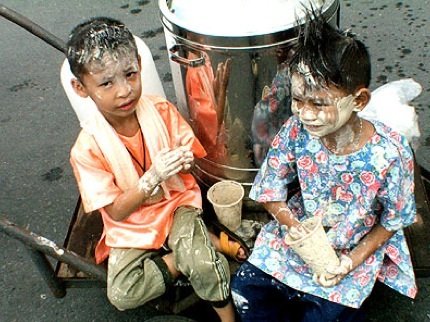
April 13–15 mark the special occasion where girls get to dress scantily in white t-shirt and short-shorts. Just like Halloween but wetter. Just kidding.
Thai New Year known as Songkran Festival is rooted in a Hmong history, a symbol of new beginning and reunion with family. Just like Thanksgiving and Christmas with less drama. 🙂
Songkran ceremony involves getting blessings from your parents or elder relatives, asking for their forgiveness. And if you’re a bad boy, you will get spanked with a lash of perfumery water and sticky powder.
Nowadays, Songkran as we know it is the occasion of a war of water with colorful guns and face-splashing hoses, ices and blasting tunes. It is the occasion where people from around the world lose themselves in the heat and crashing streams. When drunk assholes dare reach under a girl’s skirt and get their chances for sexual harassment.

The myth of Songkran is traced back to a Hmong folklore (sorry for the jarring transition). There was a clever child named Dhammaban. He is a seed of angel, literally, planted in a womb of a childless woman. When he was seven years old, he has already learned to speak in animal tongue. This half-human half-angel is so wise that, one day, Kapila Brahma (a very high-ranking angel) visits him, not to give him a present, weirdly, but to pose a riddle. The innocent child has to come up with an answer or he will be beheaded!
The riddle was: “In the morning where glory lies. At noon, where glory lies. At night, where glory lies.” The boy, cleverly, asks for seven more days to find the answer.

Six days passed and Dhammaban was dismayed. Thinking of how his headless corpse would look like, the boy fled into the wood and lay down under a tree. Luckily, thanks to his bilingualism, he listened to a married eagle-couple talking about where to dine. The husband-eagle said of course the main menu today is Dhammaban. The boy, surely, won’t be able to think of an answer to Kabila Brahma’s riddle. The bird husband then asked his wife the riddle. After she was, too, scratching her furry head for an answer, the husband solved the riddle himself:
“In the morning, glory lies in the face. That’s why people wash their face every morning.”
“At noon, glory lies in the chest. That’s why people spray perfume on their chest.”
“In the evening, glory lies in the feet. That’s why people wash their feet before bed.”

Dhammaban memorizes the husband-eagle’s answer and, come morning, repeats it to the supreme angel. Stunned, Kabila Brahma admitted his defeat and, in honor of Dhammaban, said he would cut off his head instead. But as holy a god as he is, if his head were to touch a ground, it would set an entire world on fire. And if it were to be tossed in the air, all the mists and water would burn up.
To solve this, the angel called his seven daughters. He instructed them to use a tray to carry his head and hide it in Mount Kilash. The dutiful daughters submitted to the request. And so each year one of the seven daughters would emerge to snatch her father’s head from the hidden cave, circling around Mount Kilash for 60 minutes before placing it back in the man-cave.

That concludes the myth of Songkran. Every year the goddess of Songkran is recycled like a plastic bottle with a new one popping out to float her father’s lifeless head around the mysterious mountain. This year, the goddess bestowed by such honor is Toongsa. Her vehicle is a garuda and her weapons are a seashell and a disc.

So whenever you travel to Thailand during Songkran, remember that behind every wet T-shirt is the goddess who is bereaved of her father. That once a half-human was able to pirate the bird’s answer to outwit an immortal god. Most of all, the moral of the story is that our body is a house of glory and it deserves respect and dignified treatment.

